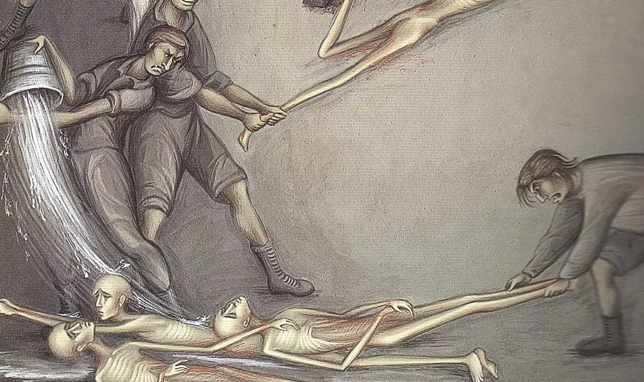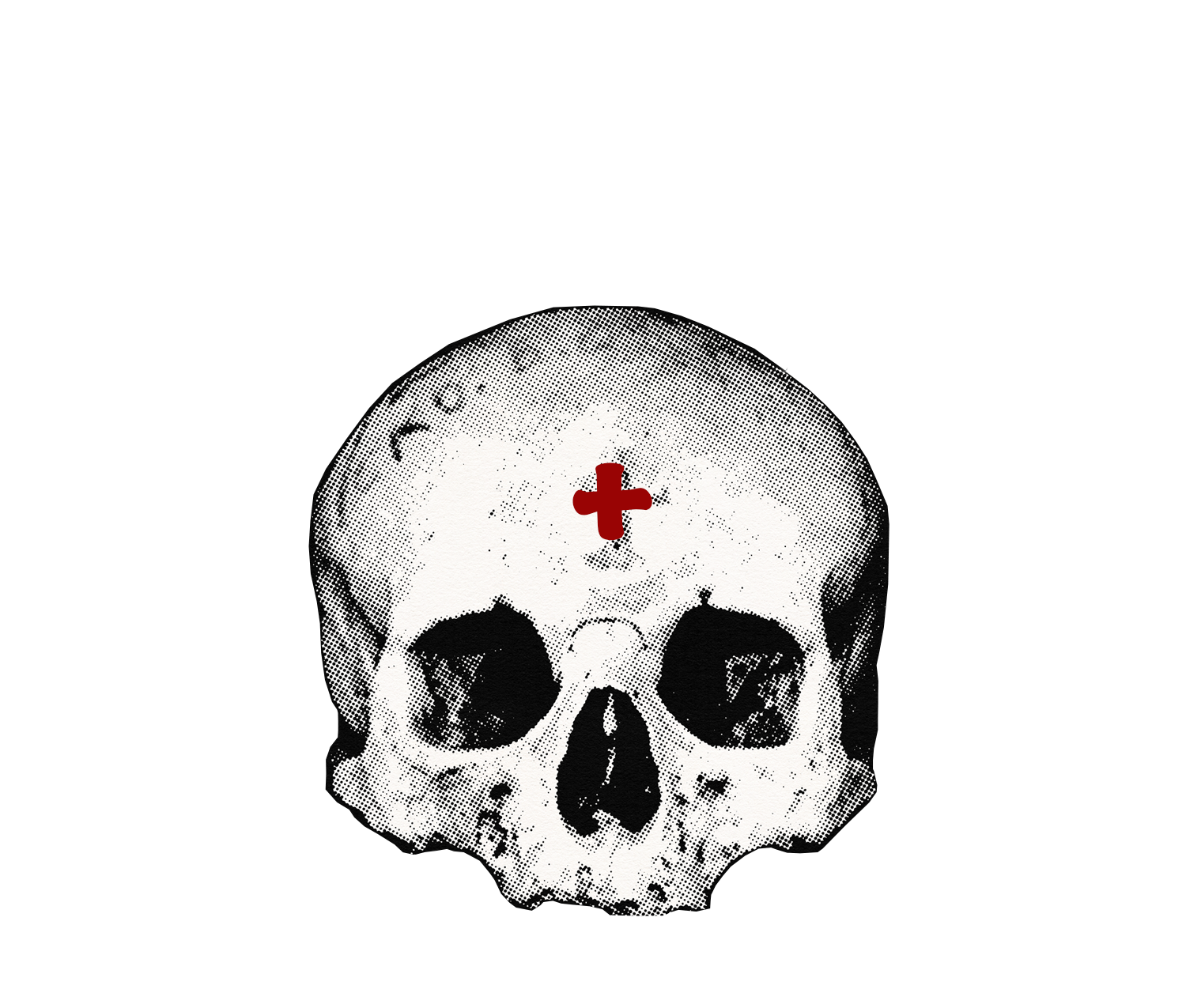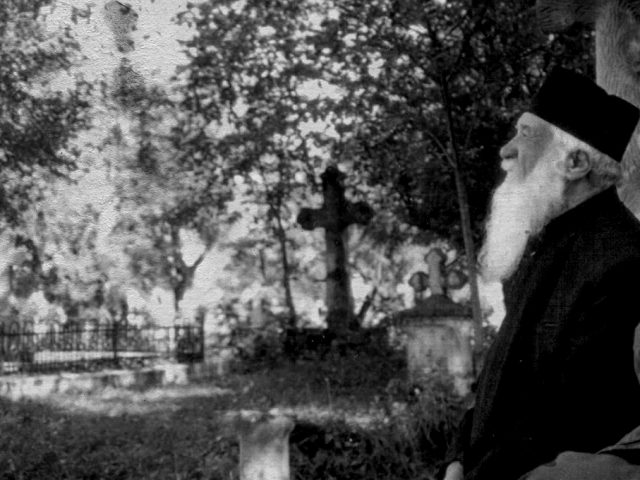By Fr George Calciu
Continued from Part II.
Below is the third recorded homily given in opposition to the law, in a series of “seven homilies to the youth” delivered as lenten meditations by Fr George Calciu to the youth in Romania. Under communist rule in Romania, Fr George was taken prisoner by the authorities for refusing to become a puppet of the government. He preached the truth openly to a society that was being contorted into a materialistic one, being stripped of all spiritual life. In the face of cruel imprisonment and unimaginable torture for which he suffered for many years, Fr George delivered to the youth a series of homilies of consolation, leading them away from the pernicious lies of a totalitarian materialistic society in order to find freedom in Christ–the Godman who was outlawed.

Depiction of the torture in Petesti torture camp, of where Fr George was a prisoner. Click to read about his time in prison.
Homily III.
We, according to His promise, look for new heavens and a new earth, wherein dwelleth righteousness. (II Peter 3:13)
YOUNG MAN, I am speaking with you again today because I have chosen you from all those to whom I could be speaking, for you are most ready to hear the Word of Christ. You are noble and pure. Atheist education has not yet managed to darken heaven within you. You still look upward, you still can hear calls from exalted places. There is no grounding the soaring of your spirit towards the heavenly spheres through the propagation of arbitrary concepts. The desire for heaven still exists within you. Materialism has not made you its prisoner.
Thus I call you seven times, young man. Seven are the praises of the day toward God, according to the Psalmist: Seven times a day have I praised Thee for the judgments of Thy righteousness (Ps. 118:164).
Today we will speak of heaven and earth. I will not frighten you with colorful descriptions of the end of the world. We stand before death daily. Its presence is more suffocating than life itself. For it is more real than life. Death is our nightmare by day and by night. You live with death by your side, friend, and yet you have not grown accustomed to its presence because you are alive and authentic — more alive and real than you think.
Heaven and earth — the concepts remind me of a poem I once heard recited by the poet himself on the television. He held his right arm up as he spoke. His face was a picture of forced inspiration and his voice recited in a monotone. He was trying to induce some kind of trance among his hearers that they might imitate him. Each verse was supported by a chorus of children chanting an artificial litany spontaneously prescribed: “Can you count us, heaven, one, two. . . three. . .“ and so forth up to ten. It was a curse, a defiance, thrown up at heaven. The poem was essentially saying that heaven might be able to count the poet and his companions one, two, three. . . — good and well, but it could not overcome them. That was the gist of it. He was an atheist poet; suited for the materialists.
But to which heaven did he address himself? Was it to the regions made up of the successive strata of the atmosphere? If so, his monologue was senseless. The poet was obviously addressing someone who could hear and even count, at least that is what one surmises from the conviction with which he spoke. How strange!
For it was not a matter of inventing a trivial personification for the sake of the poem’s rhythm, but the poet himself actually believed in the depth of his being that his appeal or invocation was being heard and that it was an act of heroism. He addressed the metaphysical heaven which tortures him, diminishes him and denies his affirmation. It is this heaven I want to talk to you about, my friend.
In the beginning God made the heaven and the earth (Genesis 1:1). He created a heaven and an earth, an imminent and a transcendent, a given material and an aspiration after perfection, a temporal space and a spaceless, timeless existence. From the moment of creation to the present we keep within ourselves the nostalgic memory of our integration with God’s heaven. We have never forgotten that there is a place in heaven to which we, or rather heaven within us, aspire.
Tell me, young man, how much have you believed the statements which you have heard repeatedly to the point of obsession, at school, on the radio, on television, in the newspapers and at young people’s meetings — that say that you descend from monkeys? And how honored this revelation has made you feel! Noam Chomsky has said that the most stupid human beings can learn to speak, but the most intelligent monkey has never reached such a height of achievement.
You are heaven and earth; darkness and light; sin and grace. I know, friend, that you are tortured by questions concerning the meaning of your life in this world, and on the purpose of the world in general. Do the ready-made authoritarian statements in answer to your limited question satisfy you: namely that heaven is a fiction and matter is everything? “It is matter speaking to you through your internal and external senses.” Matter organized its own structure and evolution by certain laws of great complexity before even the slightest rudiment of the human brain was formed. Thus once the higher brain of man appeared — the only method for matter to recognize itself — it could not recognize itself any longer. And from that time until now human intelligence has been struggling in a sterile and vain effort to discover laws which heed matter fixed in a period when there was nothing but darkness and non-consciousness!
What do you think of this joke of non-intelligence which stuns all human intelligence, even that of the collective? Do you not see that the most elementary logic obliges you to admit the presence of an intelligence outside of this world?
But I call you to a much higher flight; to total abandonment; to an act of courage which defies reason. I call you to God. To the One that transcends the world so that you might know an infinite heaven of spiritual joy, the heaven which you presently grope for in your personal hell, and which you seek even whilst in a state of non-deliberate revolt.
This heaven with its divine hierarchy and its divine light gradually descending only to return to its source which is God, does not count us in twos or fives or tens. For my friend, you are not a piece in a machine which drives you round; in the eyes of heaven you are a soul, a whole being, so free in your actions, so priceless in your worth, that God Himself, in the guise of the Second Person of the Trinity, came into the world to be crucified for you.
How ridiculous to you the poet’s curse seems. He believed so much in heaven that he needed to have a chorus of children to hide behind as a shield! Do not believe in the all-powerful nature of matter. This earth is finite. We can destroy matter in minutes through fission and achieve oblivion if we do not recognize the presence of God. The absolute claims of materialism are supported on a limited premise. You will see that the attributes of matter are purely spiritual notions — such as infinity, eternity and self-creation.
To deny the existence of heaven is to deny all existence which does not fall into the orbit of my feelings. It means that I admit that for those moments when I close my eyes or block my ears, the world becomes nonexistent.
And now I want to recite to you the most beautiful poem ever written about heaven and earth: In the beginning was the Word, and the Word was with God, and the Word was God. The same was in the beginning with God. All things were made by Him, and without Him was not anything made that was made. In Him was life; and the life was the light of men. And the light shineth in darkness; and the darkness comprehended it not. (John 1:1-5).
How can darkness confine light, or matter confine the spirit, or atheism destroy faith and constrain freedom? The heavens number you one by one; for each of you is a unique irrepeatable creation: man.
*A church destroyed by the Romanian Communist government.


